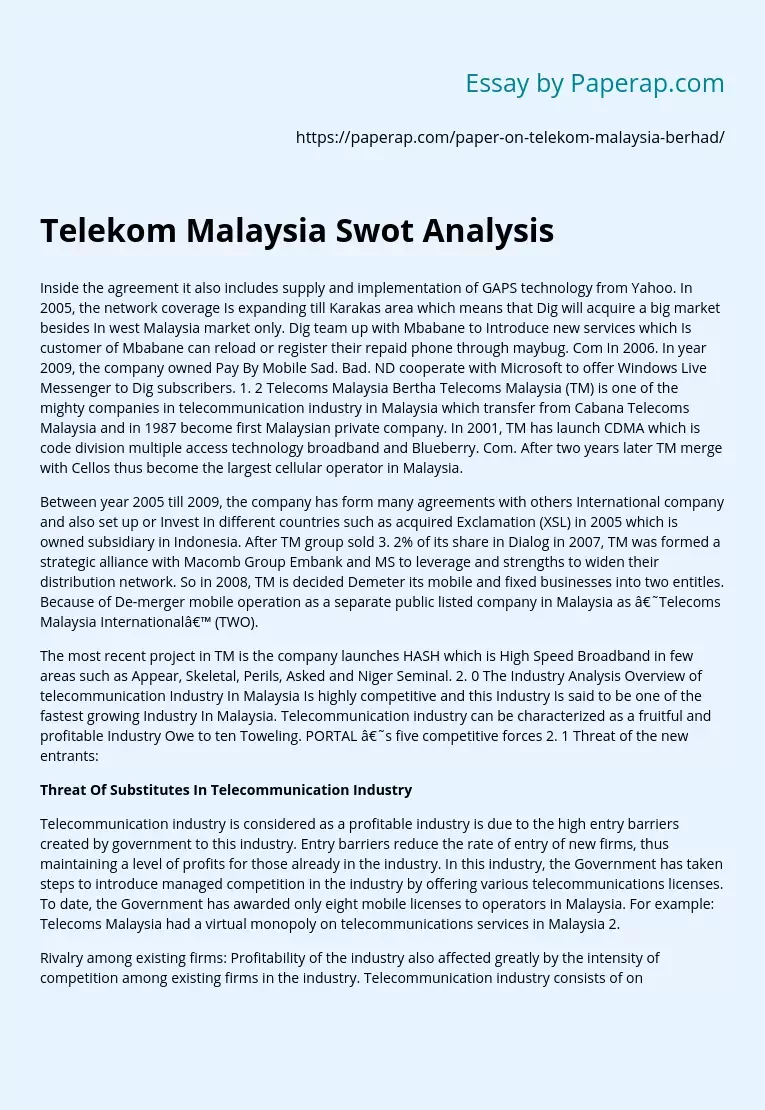Telekom Malaysia Swot Analysis
Inside the agreement it also includes supply and implementation of GAPS technology from Yahoo. In 2005, the network coverage Is expanding till Karakas area which means that Dig will acquire a big market besides In west Malaysia market only. Dig team up with Mbabane to Introduce new services which Is customer of Mbabane can reload or register their repaid phone through maybug. Com In 2006. In year 2009, the company owned Pay By Mobile Sad. Bad. ND cooperate with Microsoft to offer Windows Live Messenger to Dig subscribers.
1. 2 Telecoms Malaysia Bertha Telecoms Malaysia (TM) is one of the mighty companies in telecommunication industry in Malaysia which transfer from Cabana Telecoms Malaysia and in 1987 become first Malaysian private company. In 2001, TM has launch CDMA which is code division multiple access technology broadband and Blueberry. Com. After two years later TM merge with Cellos thus become the largest cellular operator in Malaysia.
Between year 2005 till 2009, the company has form many agreements with others International company and also set up or Invest In different countries such as acquired Exclamation (XSL) in 2005 which is owned subsidiary in Indonesia.
After TM group sold 3. 2% of its share in Dialog in 2007, TM was formed a strategic alliance with Macomb Group Embank and MS to leverage and strengths to widen their distribution network. So in 2008, TM is decided Demeter its mobile and fixed businesses into two entitles. Because of De-merger mobile operation as a separate public listed company in Malaysia as ‘Telecoms Malaysia International’ (TWO).
The most recent project in TM is the company launches HASH which is High Speed Broadband in few areas such as Appear, Skeletal, Perils, Asked and Niger Seminal.
2. 0 The Industry Analysis Overview of telecommunication Industry In Malaysia Is highly competitive and this Industry Is said to be one of the fastest growing Industry In Malaysia. Telecommunication industry can be characterized as a fruitful and profitable Industry Owe to ten Toweling. PORTAL ‘s five competitive forces 2. 1 Threat of the new entrants:
Threat Of Substitutes In Telecommunication Industry
Telecommunication industry is considered as a profitable industry is due to the high entry barriers created by government to this industry. Entry barriers reduce the rate of entry of new firms, thus maintaining a level of profits for those already in the industry. In this industry, the Government has taken steps to introduce managed competition in the industry by offering various telecommunications licenses. To date, the Government has awarded only eight mobile licenses to operators in Malaysia. For example: Telecoms Malaysia had a virtual monopoly on telecommunications services in Malaysia 2.
Rivalry among existing firms: Profitability of the industry also affected greatly by the intensity of competition among existing firms in the industry. Telecommunication industry consists of only several mobile operators such as TM, Maxis, Dig due to the entry restriction that imposed by the government. Therefore, rivalry among Competitors Telecommunication industry in Malaysia is oligopoly structure nowadays and the level of competition in this particular industry is said to be low one. 2. 3 Threat of substitute product: Another force that directly affected the profitability of an industry is the threat of bustiest product.
In Porter’s model, substitute products refer to products in other industries. Substitute product is the product or services that is different from the existing product/services but serves the similar needs. Products and services from non-traditional telecoms industries pose serious substitution threats. Cable TV and satellite operators now compete for buyers. Besides that, the substitute product for the mobile services in telecommunication also included fax, email or even letter. A threat of substitutes exists when a product’s demand is affected by the price change of a substitute product.
This threat is said to be a weak one because these substitute products such as letter or e-mail are unable to fulfill or completely replace the mobile services. 2. 4 Bargaining power of buyers Bargaining power of buyers is another force that affected the profitability in telecommunication industry. The buyers in this industry are all services customer and said to have low bargaining power to the services provider. This is because Tm is the sole provider of fixed line telephone services in Malaysia, other mobile operator such as Dig , Maxis, Cellos account for approximately 85% of mobile services in
Malaysia. As a result, this contributes to concentration of the buyers industry. Besides this, the buyers have high switching cost in this industry. As a result, the industry is more profitable when the buyers have low bargaining power (indicating that the buyers are unable to affect the setting of prices in the industry). 2. 5 Bargaining power of suppliers The last determinant of profitability in telecommunication industry is bargaining power of suppliers. The suppliers in this industry can be the suppliers of raw materials/component such as cable, broadband equipment, mobile handset, and software.
Telekom Malaysia Swot Analysis. (2019, Dec 05). Retrieved from https://paperap.com/paper-on-telekom-malaysia-berhad/

